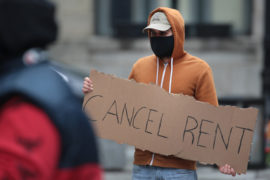A mixed bag of legislation stands to help or hinder landlords.
There’s never a dull moment when following the prolific number of proposals simmering in Sacramento, and we are not always the bearer of bad news. We can report that a measure to slash rents 25% across the board has stalled. Assembly Bill 828 will not see the light of a hearing until later this summer.
Rental property owners and operators can also breathe a sigh of relief that Assembly Bill 3260 has died on the vine. The legislation would have rewritten state law by prohibiting landlords from demanding a single, upfront security deposit and instead, allow tenants to stretch their security deposit over a six-month period or in the alternative, obtain a security deposit insurance policy to cover any damages caused upon their exit. This has been especially concerning with an exodus of tenants leaving their residence because of the pandemic, a topic we took on here.
Ominous proposals still on the horizon
Assembly Bill 1436 would compel landlords to defer rents for possibly years on end for tenants who have been unable or unwilling to pay for housing during the state of emergency.
While we would naturally expect owners to object to such a radical proposal, we were intrigued to hear a prominent tenants’ attorney vent on the issue and declare it to be bad policy.
How to pay the mortgage as renters withhold payments amid Coronavirus sheltering?
This was a provocative question Daniel was asked to chime in on, and he called for more proactive measures that protect cash-strapped owners.
Daniel floated around a sensible proposal to the San Francisco Chronicle, namely to get local and state officials together to create a pool of wealth that could come from community-minded billionaires, and in turn, cities can give interest-free loans to pay rent. Close to home, the San Francisco Board of Supervisors is considering the creation of a COVID-19 Rent Resolution and Relief Fund to provide much-needed support to eligible landlords whose tenants are unable to pay rent due to the crisis. The lion’s share of those funds would be available if approved by voters in a contemplated November ballot measure that would double the city’s transfer tax on residential and commercial property valued at $10 million or more.
On the statewide level, we were glad that lawmakers took a similarly balanced and inventive approach with a voluntary tax credit program to help landlords recoup rent that has gone unpaid during the COVID-19 crisis. It took the form of Senate Bill 1410.
In its original iteration, the bill would have covered at least 80% of unpaid rent attributable to the pandemic, in exchange for reasonable concessions on part of the landlord. Over the past week, however, the bill was watered down considerably and has lost its blessing from the California Apartment Association. Under the revamped legislation, landlords would not see relief until 2024 and then, only in the form of tax credits. In turn, tenants would be responsible for paying back the State. Many of you would say this measure is too little, too late, and that owners will not see any aid until far-flung in the future.
We hear your pain and can only say that something is better than nothing. It comes as little solace, but at least the State of California would be the debt collector. We have maintained that unpaid debt accrued during the state of emergency is not an attractive debt to chase. In San Francisco and Alameda County, however, landlords will unwittingly fill the shoes of a debt collector if back rent is not paid and to boot, cannot use the unpaid balance of rent debt accrued during the crisis as a theory to commence an unlawful detainer action.
In parting
Like most other pieces we disseminate, Bornstein Law has only scratched the surface here, but suffice it to say there is a lot on our radar and you can count on us for timely updates and informed advice whenever new laws and regulations appear. Thanks for the engagement and we look forward to continuing the conversation. An ever-expanding regulatory regime has engendered many questions, and we stand ready to answer them.




